外研版九年级英语上册教案 M5 Unit 2
外研版英语九年级上册Module 5 Unit 2 教学设计

教学文档如有疑问,请联系网站底部工作人员,将第—时间为您解决问题!文件预览:Module 5 MuseumsUnit 2 If you ever go to London, make sure you visitthe Science Museum.教学目标(知识目标)能够正确使用以下单词和词组:sand, wheel , try out , work out , experiment, physics, obey, above all ,speed, drop in .as……as , human . travel , rocket , position, unusual,communication.(能力目标)1. 能够读懂简单介绍伦敦博物馆的短文。
2. 能够对自己所熟悉的博物馆进行简单的描述。
(感情态度目标)培养对博物馆的兴趣,通过了解伦敦博物馆,,强化对西方文化的了解。
教学重难点(教学重点)能够读懂介绍伦敦博物馆的短文,并能在阅读中找出参观展馆时的一些考前须知以及遵守的规则。
(教学难点)if从句及表示禁止的祈使句教学过程Step1 Warming up1. Ask thestudents to look at the pictures in Activity 1.2. Talk about thepictures. 3. Look at thepictures and talk about the differences between the two museumsStep 2 Readingand vocabulary1. Introduce the ScienceMuseum in London and show some picture and videos.2. Ask the students to read through the passage andanswer the question.Howis the Science Museum different from other museums3. Learn some new words.Step3 Complete the table.1. Read the passageagain.2. Complete theTony’s favourite museum column in the table.Module 5 Unit 2 教案2021-4-25 21:28全部教学资源,免费、延续更新。
九年级英语外研版上Module5 Unit2 教案
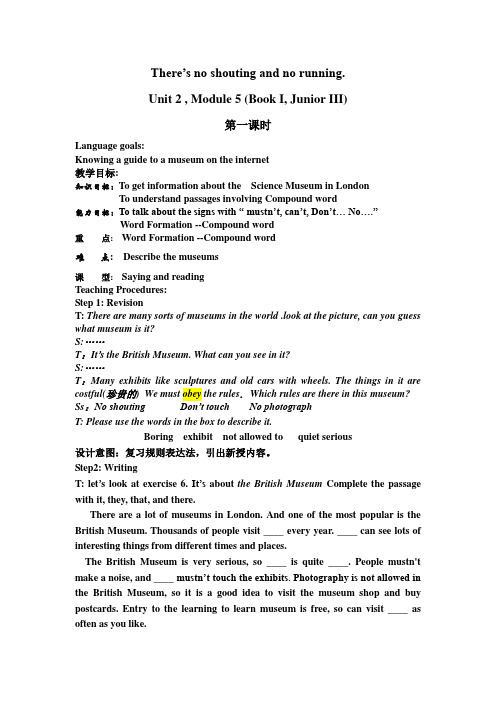
There’s no shouting and no running.Unit 2 , Module 5 (Book I, Junior III)第一课时Language goals:Knowing a guide to a museum on the internet教学目标:知识目标:To get information about the Science Museum in LondonTo understand passages involving Compound word能力目标:To talk about the signs with “ mustn’t, can’t, Don’t… No….”Word Formation --Compound word重点: Word Formation --Compound word难点: Describe the museums课型: Saying and readingTeaching Procedures:Step 1: RevisionT: There are many sorts of museums in the world .look at the picture, can you guess what museum is it?S:……T:It’s the British Museum. What can you see in it?S:……T:Many exhibits like sculptures and old cars with wheels. The things in it are costful(珍贵的)We must obey the rules.Which rules are there in this museum? Ss:No shouting Don’t touch No photographT: Please use the words in the box to describe it.Boring exhibit not allowed to quiet serious设计意图:复习规则表达法,引出新授内容。
外研版初中英语九年级上册module5unit2教学设计新部编版

教师学科教案[ 20 – 20 学年度第__学期]任教学科:_____________任教年级:_____________任教老师:_____________xx市实验学校外研版初中英语九年级上册Module 5 MueseumsUnit2 There’s no shouting and no running教学设计一、教案背景1,面向学生:□中学□小学 2,学科:英语2,课时:13,学生课前准备:一、预习单词和词汇。
二、能够根据自己的情况预习教材并进行拓展。
三、能够借助图片、生活情境介绍公共场合规则问题。
四、让学生提出自学中遇到的问题。
二、教学课题Module 5 MueseumsUnit2 There’s no shouting and no running三、教材分析本课是本模块的第二课时,在整个模块中起主导作用,侧重训练学生的听说能力。
本模块的主题是“博物馆”(Museums), 全部对话都是围绕参观展馆时的一些注意事项以及应遵守的规则进行编排的。
另外,本节课时的教学内容与设计预测可以使学生基本掌握整个模块的中心任务“能发出指令,提示某人不要做某事”。
此外,“There’s no shouting and no running ”是一篇有关礼节的阅读,是对整个单元的升华,在前几节课中,学生运用了Let’s go to the Science and Technology room. No shouting ! No entry. No photography等有礼貌地对别人发出请求和命令,本节课通过文章进一步加深对有礼貌请求句式的理解和在生活中的具体运用,同时通过对中西方礼节的对比和描述,使学生可以感受到在这个由“人”组成的社会中,每个人只有规范好自己的言行,讲究礼节,才能使整个社会处于一个“有序、和谐”的社会状态里,由此进一步提高学生的听、说、读写的综合能力。
学情分析:1. 大部分学生来自附近的农村,由于学生对英语很有兴趣,学习热情较高,乐于参与各种英语实践活动,能在小组活动中积极与他人合作,互相帮助,共同完成学习任务。
外研版九年级英语上册教案Module 5 Unit 2(外研)

Module 5 MuseumsUnit 2 If you ever go to London, makesure you visit the Science Museum同步练习The reading material mainly introduce Tony’s favourite museum—the Science Museum in London. People can not only talk about what they can do but also do many kinds of experiments there. Students can learn about the differences among museums and different cultures. And they are expected to write about their favourite museums.1.To understand the passage involving new words: experiment\chemistry\physics\control\X-ray2.To read for the main idea and specific information.能力目标:1、T o activate students’ imagination step by step and open their minds.2、To lead students to write creatively by PWP approach.情感目标:1.To help students cooperate in pair or group work.2.To enhance students’ awareness of obeying public rules and morals.drop in .as……as , human, travel, rocket, position, unusual, communication.2、能够读懂介绍伦敦博物馆的短文,并能在阅读中找出参观展馆时的一些注意事项以及遵守的规则阅读获取信息,培养学生阅读技能。
外研版英语九年级上册模块5Unit 2 读写课教案
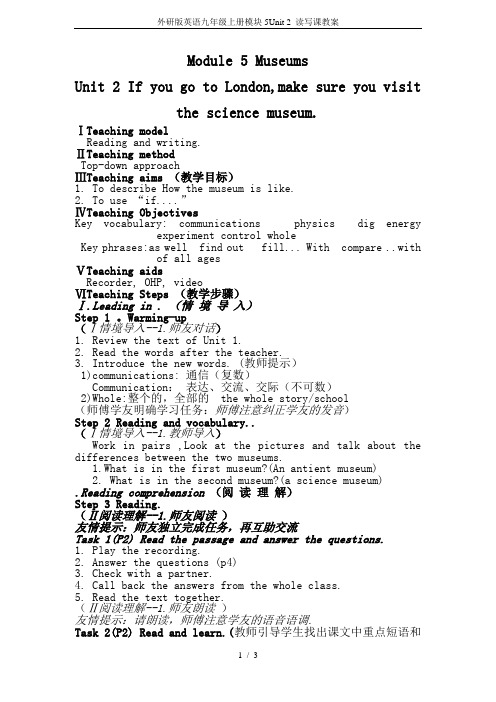
Module 5 MuseumsUnit 2 If you go to London,make sure you visitthe science museum.ⅠTeaching modelReading and writing.ⅡTeaching methodTop-down approachⅢTeaching aims(教学目标)1. To describe How the museum is like.2. To use “if....”ⅣTeaching Object ivesKey vocabulary: communications physics dig energy experiment control wholeKey phrases:as well find out fill... With compare ..with of all agesⅤTeaching aidsRecorder, OHP, videoⅥTeaching Steps(教学步骤)Ⅰ.Leading in . (情境导入)Step 1 。
Warming-up(Ⅰ情境导入--1.师友对话)1. Review the text of Unit 1.2. Read the words after the teacher.3. Introduce the new words. (教师提示)1)communications: 通信(复数)Communication:表达、交流、交际(不可数)2)Whole:整个的,全部的 the whole story/school(师傅学友明确学习任务:师傅注意纠正学友的发音)Step 2 Reading and vocabulary..(Ⅰ情境导入--1.教师导入)Work in pairs ,Look at the pictures and talk about the differences between the two museums.1.What is in the first museum?(An antient museum)2. What is in the second museum?(a science museum).Reading comprehension(阅读理解)Step 3 Reading.(Ⅱ阅读理解--1.师友阅读)友情提示:师友独立完成任务,再互助交流Task 1(P2) Read the passage and answer the questions.1. Play the recording.2. Answer the questions (p4)3. Check with a partner.4. Call back the answers from the whole class.5. Read the text together.(Ⅱ阅读理解--1.师友朗读)友情提示:请朗读,师傅注意学友的语音语调.Task 2(P2) Read and learn.(教师引导学生找出课文中重点短语和句子。
Module5Unit2教案-外研版九年级上册英语

Unit 2 If you ever go to London, make sure you visit the Science Museum.ⅠTeaching modelReading and writing.ⅡTeaching methodBottom-up approachⅢ Teaching aims1. To understand the passage;2. To get the main idea of each paragraph;3. To learn to use pronouns correctly in writing.Ⅳ Teaching ObjectivesKey vocabulary: communications, physics, chemistry, dig-dug-dug, coal, energy,X-ray, experiment, sand, control, truck, wheel, compare… with/ to, of all ages, wholeⅤ Teaching aidsOHP, multi-mediaⅥ Teaching StepsStep 1 Warming up1. Ask the students to look at the pictures in Activity 1.2. Talk about the pictures.3. Look at the pictures and talk about the differences between the two museumsStep 2 Reading and vocabulary1. Introduce the Science Museum in London and show some picture and videos.2. Ask the students to read through the passage and answer the question.How is the Science Museum different from other museums?3. Learn some new words.Step 3 Complete the table.1. Read the passage again.2. Complete the Tony’s favourite museum column in the table.3. Check the answers.Step 4 Answer the questions.1. Ask the students to read the words in the box in Activity 4.2. Ask the students to read through the questions in Activity 4.1) What can you learn about in the rooms on the second and third floors?2) What allows you to see inside your body?3) What can you do in the Launchpad?4) What can you learn about on the fourth and fifth floors?3. Finish the task.4. Check the answers.Step 5 Language points1. … if you w ant to fill a bag with sand, you have to control a kind of track on wheels and move it into the correct place. …如果你想将袋子装满沙子,你得操控一种带轮子的运输车,并把车移动到正确的位置。
外研版九年级英语上册教案 Module5 Unit2 (4)

Module 5 MuseumsUnit 2 If you ever go to London, make sure you visit the ScienceMuseum.学习目标:1.找出两个博物馆的不同。
2.阅读短文找到信息。
3.重点单词和短语的学习能力目标:掌握短文信息及细节,重点单词和短语的正确运用情感目标:了解他国文化,接受公共道德教育。
学习重点: 1. 重点单词和短语的正确运用。
2.If从句+祈使句学习难点: 1.本课所学单词,短语以及它们的用法2.If从句+祈使句学习过程:一.复习检测阅读理解(建议用时4分钟)What is a museum? A museum is a good place to keep old and beautiful things. A museum may be a place to learn about science and a place to find out about art or people or animals.What is inside a museum? Some museums have old cars and airplanes. Many museums have pictures and statues. Others have rocks and old bones. One museum even has a real old street inside. It has shops and people’s statues doing business. It looks so real that one might feel that he was back to the old times.Many cities have museums. Some very small towns have museums, too. Indianapolis has a children’s museum. Children do not have to pay toget in. Children often go to the museum. They like to look at the dinosaur bones. They can see a white bear ten feet tall.On Saturdays, Indianapolis children can hear talks about animals and trees. They see movies. They even learn to make things there.1. What is NOT true about a museum?A. It’s a good place to do some shopping..B. People can learn about science there.C. People can learn about the history of a place there.D. It’s a good place to learn about art.2. People cannot in a museum.A. see moviesB. listen to talksC. make thingsD. play with bears3. In Indianapolis, .A. there is only one museum for childrenB. it’s free for children to visit the children’s museumC. people do not have to pay to visit the children’s museumD. museums are all the same4. In the children’s museum in Indianapolis, children like to see .A. the dinosaur bonesB. all old bonesC. old streetsD. airplanes5. The main idea of the passage is that .A. old cars and airplanes are kept in museumsB. children like museumsC. there are all kinds of museumsD. animals and trees are found in museums二.自主探究:(先独学、再对学然后群学,小组讨论核对答案并找出对应信息)1. Reading (Read the passageP36 in many different ways.)相信你是最棒的2.完成下列各题1) His brother is not only a singer, but also an actor. (改为同义句)His brother is a singer _________ _________ _______ an actor.2) You mustn’t tell it to anyone. (改为祈使句)Please _________ _________ it to anyone.3) Susan, please lay the table for five. Tommy is coming too.(改为同义句Susan, please lay the table for five. Tommy is coming _________ _________4) If you _________ (not feel) well, _________ (stop) to have a rest5) Li Lei advised me to put up a “No _________(litter)” sign on the wall.三.展示提升1.细读课文解决文章中的重点,难点(小组合作,教师点拨)2. 看谁是翻译高手1)放风筝在所有年龄段的人中都受欢迎。
Module5Unit2教案九年级英语上册
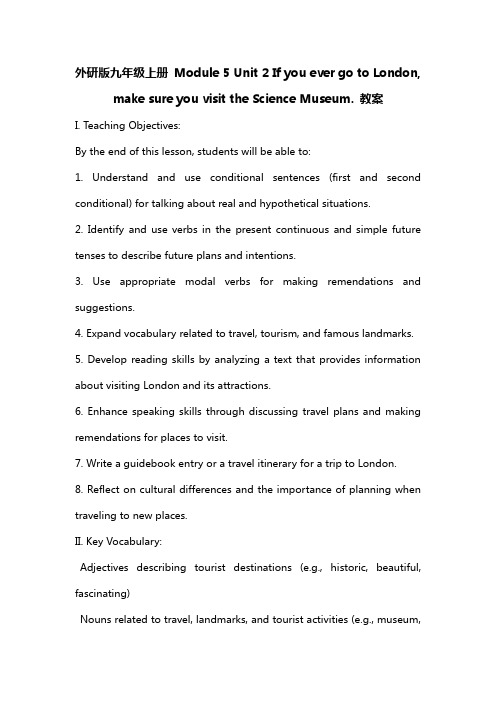
外研版九年级上册Module 5 Unit 2 If you ever go to London, make sure you visit the Science Museum. 教案I. Teaching Objectives:By the end of this lesson, students will be able to:1. Understand and use conditional sentences (first and second conditional) for talking about real and hypothetical situations.2. Identify and use verbs in the present continuous and simple future tenses to describe future plans and intentions.3. Use appropriate modal verbs for making remendations and suggestions.4. Expand vocabulary related to travel, tourism, and famous landmarks.5. Develop reading skills by analyzing a text that provides information about visiting London and its attractions.6. Enhance speaking skills through discussing travel plans and making remendations for places to visit.7. Write a guidebook entry or a travel itinerary for a trip to London.8. Reflect on cultural differences and the importance of planning when traveling to new places.II. Key Vocabulary:Adjectives describing tourist destinations (e.g., historic, beautiful, fascinating)Nouns related to travel, landmarks, and tourist activities (e.g., museum,tour, attraction)Verbs associated with traveling and remending (e.g., visit, explore, see, remend)Adverbs indicating frequency and possibility (e.g., always, never, possibly)III. Target Language Structures:First conditional sentences ("If ..., then ...") for predicting outes based on conditions.Second conditional sentences ("If ... were to ..., then ... would ...") for talking about unlikely or imaginary situations.Use of the present continuous tense for current travel plans or arrangements.Simple future tense for predicting future actions and events related to travel.Modal verbs (should, must, might) for giving advice or expressing likelihood in a travel context.IV. Teaching Aids:Maps of London highlighting major landmarks and attractions. Whiteboard and markers for grammar explanation and writing key sentences.Audio material featuring dialogues or narratives about travel experiences in London.Handouts with exercises on conditional sentences, future tenses, modal verbs, new vocabulary, and a writing prompt for a travel guide or itinerary.V. Teaching Procedures:Step 1: Warmup (5 minutes)Begin with a discussion about previous travel experiences and dream destinations.Elicit key vocabulary from students and write it on the board.Step 2: Listening (10 minutes)Play an audio track that presents a conversation about planning a trip to London.After listening, ask prehension questions to check understanding of the content.Step 3: Speaking Practice (15 minutes)Students work in pairs or small groups to discuss their own hypothetical trips to London and plan what they would like to do and see. Conduct a class activity where each group shares their travel plans and gives remendations using conditional sentences and future tenses. Step 4: Grammar Focus (10 minutes)Review the usage of first and second conditional sentences for talking about real and hypothetical situations.Introduce and practice the present continuous and simple future tensesin the context of travel planning.Review the use of modal verbs for giving advice and expressing possibility in a travel context.Step 5: Reading (10 minutes)Distribute a text about London's attractions, guiding students through it to identify target language structures and new vocabulary.Ask students to summarize the main points and the remendations given in the text.Step 6: Writing Task (10 minutes)Hand out worksheets with exercises on constructing sentences using conditional sentences, future tenses, and modal verbs.Assign a written task where students create a guidebook entry or a travel itinerary for a trip to London, based on their own research or imagination.Step 7: Homework & Review (5 minutes)Assign homework for students to plete their guidebook entry or travel itinerary, incorporating feedback from the writing task.Review key points from the lesson through a quick quiz or verbal questioning.VI. Assessment:Evaluate students based on their participation in speaking activities, correct usage of conditional sentences, future tenses, and modal verbs inoral and written assignments, and pletion of homework tasks.Assess listening skills through prehension questions related to the audio content about planning a trip to London.Assess reading prehension through a short quiz targeting the main points and details of the provided text about London's attractions. Review the ability to express future plans, make remendations, and talk about hypothetical travel scenarios using the learned language structures and vocabulary.。
新外研版九年级上册英语 Module 5 Unit 2 教案(教学设计)

Module5 MuseumsUnit 2 If you ever go to London, make sure you visitthe Science Museum.单词communications,physics,chemistry,if 引导的条件状语从句。
if 引导的条件状语从句主从句的时态问题。
Step 1 情景导入(一)T:Have you travelled any museum?S1:Yes.T:How many kinds of museums are there?S2:I don’t know.T:What kind of museum do you know?S2:History museum, science museum, space museum…T:Good!Do you know the toilet museum?S:Toilet museum? How interesting!T:Different kinds of museums are different.Today we will learn science museum.Do you want to learn about it?S:Yes, of course.T:OK.Let’s look at the pictures…(二)T:Do you remember the differences between the Science Museum and other museums?Tell us.Some students answer the question.Step 2 完成教材 Activities 1,2的任务1.Work in pairs. Look at the pictures and talk about the differences between the two museums.(Activity 1)(1)教师引导学生预习与图片相关的新词汇。
外研版九年级英语上册 Module 5 unit2 If you ever go to Lo

外研版初三上册Module 5 Unit 2教学设计本课通过阅读输入——读前支架准备(创设情境,导入课堂)+ 读中支架搭建(个人静思,形成阅读习惯);实现写作输出——读后支架撤销(小组协作,碰撞思维火花)。
(一)教材分析:外研版初三上册Module 5 Museums, Unit 2 If you ever go to London, make sure you visit the Science Musuem.是对位于伦敦的英国科学博物馆的介绍,在这里,参观者不仅可以跑、跳、说话,还可以参与各类科学试验活动,这与大多数博物馆内的风格迥然不同。
通过打破对博物馆的固化认识,让学生感受不同风格、不同类型的博物馆。
通过学习,可以帮助学生了解他国文化,接受公共道德规范教育。
(二)学情分析:通过前几个模块对状语从句的学习,有利于学生对本课if条件状语从句的感知、学习、掌握,但相当一部分初三学生暴露出读写水平不稳定,读写能力不强,读写思维能力有待提升的情况。
针对学生的情况,通过“读写结合、以读促写”的教学设计,促进学生读写水平的提升。
(三)教学流程:(1)支架准备:创设情境,导入课堂教师通过播放往届学生参观广东科学馆的视频片段,让学生真实感受同龄人悬空骑自行车的惊险与镜象的神奇魔力,打破学生头脑中原有关于博物馆安静沉闷的刻板形象。
同时,教师展示思维导图,提示本课话题:“How is the Science Museum different from other museums?”,让学生小组互助,就科学博物馆与其它博物馆的差异展开讨论。
通过创设情境,触动学生的情感,让学生有话可说、有话想说,激发学生阅读兴趣,为学生提供读写思维的依据。
(2)支架搭建:个人静思,形成阅读习惯(A)整体阅读:。
新外研版英语九年级上册教案Module5Unit2
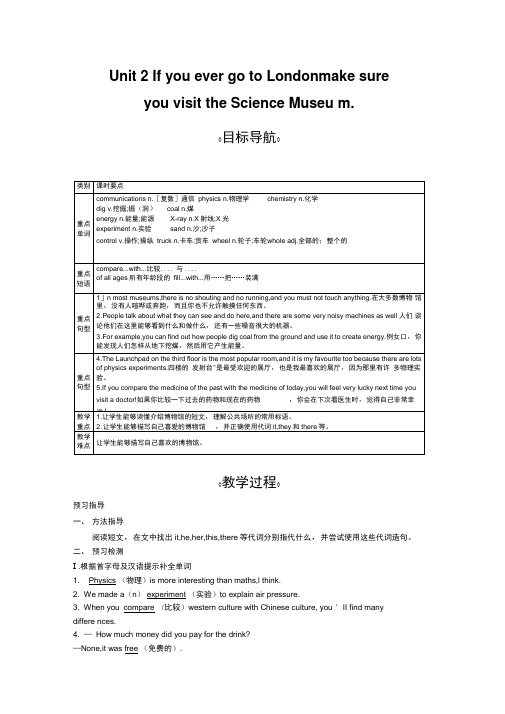
2024年高铁退票规则新规
2024年高铁退票规则如下:
- 梯次退票政策:
- 开车前8天(含)以上退票的,不收取退票费。
- 开车前48小时以上的按票价5%计。
- 开车前24小时以上、不足48小时的按票价10%计,不足24小时的按票价20%计。
- 开车前48小时~8天期间内,改签或变更到站至距开车8天以上的其他列车,又在距开车8天前退票的,仍核收5%的退票费。
- 办理车票改签或“变更到站”时,新车票票价低于原车票的,退还差额,对差额部分核收退票费并执行现行退票费标准。
尾数以5角为单位,尾数小于2.5角的舍去、2.5角及以上且小于7.5角的计为5角、7.5角及以上的进为1元。
退票费最低按2元计收。
此外,2024年高铁退票还有一些其他规定,如:旅客不能按票面指定的乘车站、日期、车次乘车时,应当在票面指定的开车时间前到车站办理一次提前或推迟乘车签证手续。
特殊情况经购票地车站或票面乘车站站长同意的,可在开车后2小时内办理;持动车组列车车票的旅客改乘当日其他动车组列车时不受开车后2小时内限制。
团体旅客不应晚于开车前48小时。
外研版九年级英语上册教案Module 5 Unit 2

Module 5 MuseumsUnit 2 If you ever go to London, make sure you visit the Science Museum.教材分析This is the second lesson in this module. The reading material is information about heroes. It’s a good text to help the students improve their reading strategies, such as getting information from the reading material.教学目标【知识目标】I. Key words:communications, physics, chemistry, dig, coal, energy, X-ray, experiment, sand, control, truck, wheel, wholeII. Key phrases: compare...with..., of all ages, as well, find out, have a wonderful timeIII. Key sentences:( I ) In most museums, there is no shouting and no running.( II ) If you want answers to all your questions about science, this is the right place for you.( III ) So if you ever go to London, make sure you visit the Science Museum.【能力目标】I.To understand a passage about museums.II.To describe Ss’ own favorite museums.【情感目标】To increase the sense of exploring science in Ss’ daily life.教学重难点【教学重点】To grasp the key words, expressions, structures and grammar in Unit 2.【教学难点】To improve reading analysis abilities and problem-sloving abilities.课前准备Multimedia教学过程Step I Warming up and leading in1. T introduces different museums in the world: Louvre Museum, Paris, Metropolitan Museum of Art, New York,British Museum, London and Winter Palace, St.Petersburg.2. Talk about rules in the museum.【设计意图】通过讨论世界各地有名的博物馆,使学生明确单元主题,铺垫基础词汇,并让学生了解在博物馆要遵守的规则,为下一步语篇学习做好准备。
外研版九年级英语上册同步教案m5 unit2 if you ever go to london,make sure you visit the science museum

Tony’s favourite museum
Your favourite museum
Name
Place
Favourite room
Opening hours
Price
Ss:Read the text carefully and check answers in pairs. T:Show the right answers.
◆Step 6 Blackboard design
Module 5 Unit 2 If you ever go to London,make sure you visit the Science Museum.
(1)In most museums,there is no shouting and no running.
(整个的)class was very quiet and no one spoke.
2.Those two children
(挖掘)a hole and planted an apple tree.
3.—Can Mike
(操作)the new machine well?
—Sure! He is very clever.
能
力 能够读懂关于介绍博物馆的短文,能够描写自己喜爱的博物馆。
目
标
情
感 增强对科学的探索求知意识。
目
标
教学 重 难点
重点:掌握本单元的重点词汇、短语、句型和语法。 难点:训练学生的阅读分析能力、解决问题的能力。
教学过程
◆Step 1 Warming up and leading in
T:Look at the pictures in Activity 1 and talk about the differences between the two museums.
Module5Unit2教案外研版英语九年级上册

Objective:By the end of the lesson, students will be able to:➢Understand the importance of visiting the Science Museum in London.➢Develop their listening, speaking, reading, and writing skills.➢Express their opinions and describe their experiences at a science museum.Materials:✓Textbook: Module 5 Unit 2 of FLTRP New Standard English 9th Grade ✓Whiteboard or flipchart✓Whiteboard markers or chalk✓Pictures or videos of the Science Museum in London✓Worksheets for reading and writing exercisesWarm-up activity :1.Display pictures or videos of the Science Museum in London on theboard.2.Engage the students in a discussion by asking them to describe whatthey see and share any prior knowledge or experiences they have had with science museums.3.Introduce the topic by telling the students that they will learn aboutthe Science Museum in London and the reasons why it is worth visiting.Vocabulary introduction :1)Introduce and explain new vocabulary words related to museumsand science, such as “exhibits,”“interactive,”“technology,”etc.2)Write the words on the board and provide definitions and examplesto help students understand their meanings and usage.3)Practice pronouncing the words together as a class, focusing oncorrect pronunciation and intonation.Listening and comprehension:1.Play an audio clip or show a video about the Science Museum inLondon.2.Ask the students to listen carefully and take notes on the mainattractions, interactive exhibits, and the importance of science education.3.Conduct a class discussion to check their comprehension andencourage them to share their thoughts and opinions on the museum.Reading and comprehension :1)Assign the students a reading passage about the Science Museumfrom the textbook or other relevant materials.2)Ask them to read the text individually and identify the main ideas,supporting details, and any unfamiliar words.3)Distribute worksheets with comprehension questions for thestudents to answer based on the reading passage.4)Review the answers as a class and address any misconceptions ordifficulties.Speaking and role-play activity:1.Divide the class into pairs or small groups and assign them roles asvisitors to the Science Museum.2.Instruct the students to have a conversation where they discuss theirfavorite exhibits, share interesting facts they learned, and persuade each other to visit the museum.3.Encourage the students to use the vocabulary and expressionsrelated to the topic and to practice active listening and effective communication skills.Writing activity :1)Ask the students to individually write a short paragraph or apersuasive essay about why they think people should visit the Science Museum in London.2)Instruct them to include specific details and examples to supporttheir opinions.3)Review and provide feedback on their written responses, focusing onorganization, clarity of ideas, and the use of appropriate vocabulary. Wrap-up and reflection❖Summarize the main points discussed during the lesson about the Science Museum in London.❖Engage the students in a brief discussion by asking them to share one thing they are excited to see or do at the Science Museum.。
Module5Unit2教案-外研版九年级上册英语
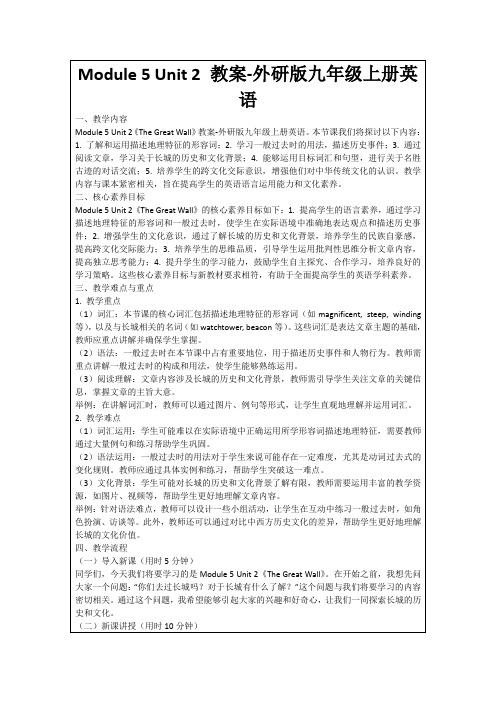
1.在讲解语法难点时,结合生活实例,让学生更加直观地理解一般过去时的用法。
2.在提问环节,注重问题的质量,提高问题的启发性和开放性,引导学生深入思考。
3.加强课堂练习,特别是在写作环节,让学生多写、多练,提高他们对一般过去时的运用能力。
4.针对学生的个体差异,进行个性化辅导,帮助他们在难点上取得突破。
二、核心素养目标
Module 5 Unit 2《The Great Wall》的核心素养目标如下:1.提高学生的语言素养,通过学习描述地理特征的形容词和一般过去时,使学生在实际语境中准确地表达观点和描述历史事件;2.增强学生的文化意识,通过了解长城的历史和文化背景,培养学生的民族自豪感,提高跨文化交际能力;3.培养学生的思维品质,引导学生运用批判性思维分析文章内容,提高独立思考能力;4.提升学生的学习能力,鼓励学生自主探究、合作学习,培养良好的学习策略。这些核心素养目标与新教材要求相符,有助于全面提高学生的英语学科素养。
(2)语法运用:一般过去时的用法对于学生来说可能存在一定难度,尤其是动词过去式的变化规则。教师应通过具体实例和练习,帮助学生突破这一难点。
(3பைடு நூலகம்文化背景:学生可能对长城的历史和文化背景了解有限,教师需要运用丰富的教学资源,如图片、视频等,帮助学生更好地理解文章内容。
举例:针对语法难点,教师可以设计一些小组活动,让学生在互动中练习一般过去时,如角色扮演、访谈等。此外,教师还可以通过对比中西方历史文化的差异,帮助学生更好地理解长城的文化价值。
(3)阅读理解:文章内容涉及长城的历史和文化背景,教师需引导学生关注文章的关键信息,掌握文章的主旨大意。
举例:在讲解词汇时,教师可以通过图片、例句等形式,让学生直观地理解并运用词汇。
外研版九年级英语上册教案 Module5 Unit2 (2)

Module 8 Public holidaysUnit1 It’s the last day before the newschool year begins.Teaching aims1.V ocabulary: celebrate, date, Labour Day, national, picnic, season, special, vacation.2. Everyday English: We only have one day off. Do you do anything special? Do you have any plans for May Day holiday?3. Master the use of the dates.4. Be able to talk about a public holiday and write a passage about it . Keypoints1. The use of the dates.2. Write a short passage about a public holiday.Teaching proceduresStep 1. Show a picture that “You are the best.”I believe you are the best.设计意图:激发学生的学习热情。
Step 2. VocabularyReview the words and expressions.Check the words and expressions.设计意图:让学生学习和记忆单词,为后面的对话学习扫清障碍。
Step 3. Revision .Review the twelve months and the numbers from one to thirty-one. 设计意图:复习月份和序数词,为后面学习日期扫清障碍。
外研版-英语-九上-外研九上英语教案Module5 2单元

(1)In most museums,there is no shouting and no running. (2)If you want answers to all your questions about science,this is the right place for you. (3)So if you ever go to London,make sure you visit the Science Museum. ◆Step 7 Exercises
设计意图 通过阅读和练习,要求学生根据文章内容辨认捕捉细节信息,并完成表格
◆Step 5 Translate and remember T:(1)Read the passage and try to translate. (2)Know how to use “if,no+ v.-ing”.
设计意图 巩固课堂知识,掌握关键句的理解,知道如何运用 if 条件句+祈使句。
设计意图 通过对问题的预测,可以使学生的思维方向和课文主题契合,提高解决问题的能力。
◆Step 3 Fast reading
T:Read the passage and check the answer.
Ss:...
设计意图
提高学生总结概括的能力
初中-英语-打印版
初中-英语-打印版
◆Step 4 Careful reading T:Complete the Tony’s favourite museum column in the table.
- 1、下载文档前请自行甄别文档内容的完整性,平台不提供额外的编辑、内容补充、找答案等附加服务。
- 2、"仅部分预览"的文档,不可在线预览部分如存在完整性等问题,可反馈申请退款(可完整预览的文档不适用该条件!)。
- 3、如文档侵犯您的权益,请联系客服反馈,我们会尽快为您处理(人工客服工作时间:9:00-18:30)。
Book 5 Module 5 Museums
一、教学内容:Unit 2 If you ever go to London, make sure you visit the Science Museum.
二、课型:Reading and writing
三、教学目标:
1、能够听懂并正确地朗读下列单词:communications,physics,chemistry,Dig coal,
energy,X-ray,experiment,sand,control,truck,wheel,compare…wit h,of all ages,whole
2、语法:能掌握用if引导的条件状语从句。
3、能够读懂介绍博物馆的短文,理解公开场所的常用标语。
4、能描写自己喜爱的博物馆,并能正确使用代词it, they, there
四、教学重难点:
1、能够理解介绍博物馆的短文。
2、能够正确运用if等词引导的状语从句于写作之中。
五、教学准备:课堂整体运用任务型教学模式以及阅读课“四个阶段”教学模式。
本课
指导学生通过阅读获取信息,培养学生阅读技能。
在教学过程中,采用多媒体手段辅助教学,利用各种图片和习题任务贯穿整个教学过程。
因此,本节课需准备:PPT课件。
六、教学过程:
达标训练题
Quiz
Ⅰ. 用方框里的词的适当形式完成句子。
sand control energy truck chemistry
1. With growth, demand for ________ continues to rise.
2. Look over there! The kids are playing with ________ on the beach.
3. I’m afraid that the ________ isn’t large enough to carry all the things.
4. __________ was her favorite subject at school.
5. It’s difficult to _______ an aircraft a t high school.
Ⅱ. 根据要求完成下列句子。
1. Shakespeare was not only a writer but also an actor. (改写同义句)
Shakespeare was an actor ___________ a writer.
2. He wrote hundreds of beautiful pieces of music for the orchestra as well. (改写同义句)
He _______ wrote hundreds of beautiful pieces of music for the orchestra.
3. If you ________ her work _______ his, you’ll find hers is much better.
要是比较一下他们两个的作品,你就发现她的好很多。
4. 如果你能来,请告诉我。
——————————————。
